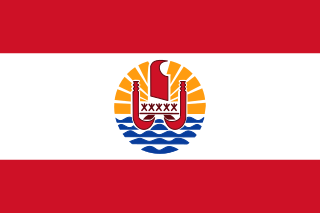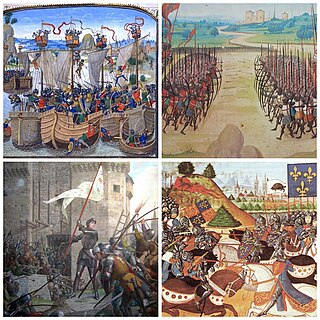
French is a Romance language of the Indo-European family. It descended from the Vulgar Latin of the Roman Empire, as did all Romance languages. French evolved from Gallo-Romance, the spoken Latin in Gaul, and more specifically in Northern Gaul. Its closest relatives are the other langues d'oïl—languages historically spoken in northern France and in southern Belgium, which French (Francien) has largely supplanted. French was also influenced by native Celtic languages of Northern Roman Gaul like Gallia Belgica and by the (Germanic) Frankish language of the post-Roman Frankish invaders. Today, owing to France's past overseas expansion, there are numerous French-based creole languages, most notably Haitian Creole. A French-speaking person or nation may be referred to as Francophone in both English and French.

French Polynesia is an overseas collectivity of the French Republic and the only overseas country of France. It is composed of 118 geographically dispersed islands and atolls stretching over an expanse of more than 2,000 kilometres (1,200 mi) in the South Pacific Ocean. Its total land area is 4,167 square kilometres (1,609 sq mi).

The French Revolution was a period of far-reaching social and political upheaval in France and its colonies beginning in 1789. The Revolution overthrew the monarchy, established a republic, catalyzed violent periods of political turmoil, and finally culminated in a dictatorship under Napoleon who brought many of its principles to areas he conquered in Western Europe and beyond. Inspired by liberal and radical ideas, the Revolution profoundly altered the course of modern history, triggering the global decline of absolute monarchies while replacing them with republics and liberal democracies. Through the Revolutionary Wars, it unleashed a wave of global conflicts that extended from the Caribbean to the Middle East. Historians widely regard the Revolution as one of the most important events in human history.

Louis XIV, known as Louis the Great or the Sun King, was a monarch of the House of Bourbon who reigned as King of France from 1643 until his death in 1715. Starting on 14 May 1643 when Louis was 4 years old, his reign of 72 years and 110 days is the longest recorded of any monarch of a sovereign country in European history. In the age of absolutism in Europe, Louis XIV's France was a leader in the growing centralisation of power.

Monaco, officially the Principality of Monaco, is a sovereign city-state, country, and microstate on the French Riviera in Western Europe. France borders the country on three sides while the other side borders the Mediterranean Sea.

Paris is the capital and most populous city of France, with an area of 105 square kilometres and an official estimated population of 2,140,526 residents as of 1 January 2019. Since the 17th century, Paris has been one of Europe's major centres of finance, commerce, fashion, science, and the arts.

Marie Antoinette was the last Queen of France before the French Revolution. She was born an Archduchess of Austria and was the penultimate child and youngest daughter of Empress Maria Theresa and Francis I, Holy Roman Emperor. She became Dauphine of France in May 1770 at age 14 upon her marriage to Louis-Auguste, heir apparent to the French throne. On 10 May 1774, her husband ascended the throne as Louis XVI and she assumed the title Queen of France and Navarre, which she held until September 1791, when she became Queen of the French as the French Revolution proceeded, a title that she held until 21 September 1792.

The Napoleonic Wars (1803–1815) were a series of major conflicts pitting the French Empire and its allies, led by Napoleon I, against a fluctuating array of European powers formed into various coalitions, financed and usually led by the United Kingdom. The wars stemmed from the unresolved disputes associated with the French Revolution and its resultant conflict. The wars are often categorised into five conflicts, each termed after the coalition that fought Napoleon: the Third Coalition (1805), the Fourth (1806–07), the Fifth (1809), the Sixth (1813), and the Seventh (1815).

Charles André Joseph Marie de Gaulle was a French army officer and statesman who led the French Resistance against Nazi Germany in World War II and chaired the Provisional Government of the French Republic from 1944 to 1946 in order to establish democracy in France. In 1958, he came out of retirement when appointed President of the Council of Ministers by President René Coty. He was asked to rewrite the Constitution of France and founded the Fifth Republic after approval by referendum. He was elected President of France later that year, a position he was reelected to in 1965 and held until his resignation in 1969. He was the dominant figure of France during the Cold War era, and his memory continues to influence French politics.

Louis XVI, born Louis-Auguste, was the last King of France before the fall of the monarchy during the French Revolution. He was referred to as Citizen Louis Capet during the four months before he was guillotined. In 1765, at the death of his father, Louis, son and heir apparent of Louis XV, Louis-Auguste became the new Dauphin of France. Upon his grandfather's death on 10 May 1774, he assumed the title "King of France and Navarre", which he used until 4 September 1791, when he received the title of "King of the French" until the monarchy was abolished on 21 September 1792.

Ivory Coast or Côte d'Ivoire, officially the Republic of Côte d'Ivoire, is a country located on the south coast of West Africa. Ivory Coast's political capital is Yamoussoukro, while its economic capital and largest city is the port city of Abidjan. It borders Guinea and Liberia to the west, Burkina Faso and Mali to the north, Ghana to the east, and the Gulf of Guinea to the south.

Napoleon III was the first elected President of France from 1848 to 1852. When he could not constitutionally be re-elected, he seized power in 1851 and became the Emperor of the French from 1852 to 1870. He founded the Second French Empire and was its only emperor until the defeat of the French army and his capture by Prussia and its allies in the Franco-Prussian War in 1870. He worked to modernize the French economy, rebuilt the center of Paris, expanded the overseas empire, and engaged in the Crimean War and the war for Italian unification. After his defeat and downfall he went into exile and died in England in 1873.

Napoléon Bonaparte was a French statesman and military leader who rose to prominence during the French Revolution and led several successful campaigns during the French Revolutionary Wars. He was Emperor of the French as Napoleon I from 1804 until 1814 and again briefly in 1815 during the Hundred Days. Napoleon dominated European and global affairs for more than a decade while leading France against a series of coalitions in the Napoleonic Wars. He won most of these wars and the vast majority of his battles, building a large empire that ruled over much of continental Europe before its final collapse in 1815. He is considered one of the greatest commanders in history, and his wars and campaigns are studied at military schools worldwide. Napoleon's political and cultural legacy has endured as one of the most celebrated and controversial leaders in human history.

The France national football team represents France in international football and is controlled by the French Football Federation, also known as FFF, or in French: Fédération française de football. The team's colours are blue, white and red, and the coq gaulois its symbol. France are colloquially known as Les Bleus. The French side are the reigning World Cup holders, having won the 2018 FIFA World Cup on 15 July 2018.

France, officially the French Republic, is a country whose territory consists of metropolitan France in Western Europe and several overseas regions and territories. The metropolitan area of France extends from the Mediterranean Sea to the English Channel and the North Sea, and from the Rhine to the Atlantic Ocean. It is bordered by Belgium, Luxembourg and Germany to the northeast, Switzerland and Italy to the east, and Andorra and Spain to the south. The overseas territories include French Guiana in South America and several islands in the Atlantic, Pacific and Indian oceans. The country's 18 integral regions span a combined area of 643,801 square kilometres (248,573 sq mi) and a total population of 67.3 million. France, a sovereign state, is a unitary semi-presidential republic with its capital in Paris, the country's largest city and main cultural and commercial centre. Other major urban areas include Lyon, Marseille, Toulouse, Bordeaux, Lille and Nice.

The Hundred Years' War was a series of conflicts waged from 1337 to 1453 by the House of Plantagenet, rulers of the Kingdom of England, against the French House of Valois, over the right to rule the Kingdom of France. Each side drew many allies into the war. It was one of the most notable conflicts of the Middle Ages, in which five generations of kings from two rival dynasties fought for the throne of the largest kingdom in Western Europe. The war marked both the height of chivalry and its subsequent decline, and the development of strong national identities in both countries.

The Seven Years' War was a global conflict fought between 1756 and 1763. It involved every European great power of the time and spanned five continents, affecting Europe, the Americas, West Africa, India, and the Philippines. The conflict split Europe into two coalitions, led by the Kingdom of Great Britain on one side and the Kingdom of France, the Russian Empire, the Kingdom of Spain, and the Swedish Empire on the other. Meanwhile, in India, some regional polities within the increasingly fragmented Mughal Empire, with the support of the French, tried to crush a British attempt to conquer Bengal. The war's extent has led some historians to describe it as "World War Zero", similar in scale to other world wars.

Vichy France is the common name of the French State headed by Marshal Philippe Pétain during World War II. Evacuated from Paris to Vichy in the unoccupied "Free Zone" in the southern part of metropolitan France which included French Algeria, it remained responsible for the civil administration of France as well as the French colonial empire.

French Guiana is an overseas department and region of France, on the north Atlantic coast of South America in the Guyanas. It borders Brazil to the east and south and Suriname to the west. Since 1981, when Belize became independent, French Guiana has been the only territory of the mainland Americas that is still part of a European country.

The Dassault Rafale is a French twin-engine, canard delta wing, multirole fighter aircraft designed and built by Dassault Aviation. Equipped with a wide range of weapons, the Rafale is intended to perform air supremacy, interdiction, aerial reconnaissance, ground support, in-depth strike, anti-ship strike and nuclear deterrence missions. The Rafale is referred to as an "omnirole" aircraft by Dassault.


















